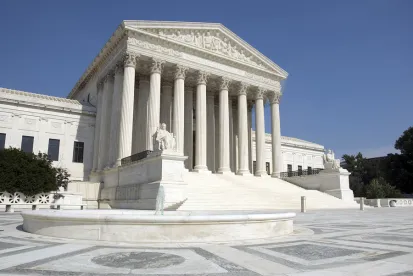The U.S. Supreme Court will hear a case that has dramatic and sweeping implications for proceedings before the Patent Trial and Appeal Board (PTAB). On October 13, 2020, the Supreme Court granted three petitions for writ of certiorari related to Arthrex, Inc. v. Smith & Nephew, Inc. that will address whether or not administrative patent judges of the U.S. Patent and Trademark Office have been constitutionally appointed.
The Federal Circuit concluded last October that PTAB judges were principal officers appointed in violation of the Constitution, and held that the proper remedy was to judicially eliminate their for-cause removal protections. This decision resulted in the remand of scores of PTAB cases that had reached final written decisions which, in turn, forced the Chief Administrative Patent Judge to issue a general order holding in abeyance all cases remanded until the Supreme Court acts on a petition for certiorari.
As discussed in greater detail on Foley & Lardner’s PTAB Trial Insights blog, Arthrex, Smith & Nephew, and the U.S. Government each filed separate certiorari petitions encouraging the Supreme Court to consider the issues surrounding the constitutionality of the PTAB judges.
Now, the Supreme Court has granted certiorari for the petitions from the U.S. Government, Smith & Nephew, and Arthrex. The Court has consolidated these cases and limited the scope to the following two questions presented by the Government in a memorandum:
-
Whether, for purposes of the Appointments Clause, U.S. Const. Art. II, § 2, Cl. 2, administrative patent judges of the U.S. Patent and Trademark Office are principal officers who must be appointed by the President with the Senate’s advice and consent, or “inferior Officers” whose appointment Congress has permissibly vested in a department head.
-
Whether, if administrative patent judges are principal officers, the court of appeals properly cured any Appointments Clause defect in the current statutory scheme prospectively by severing the application of 5 U.S.C. 7513(a) to those judges.
If the Court reverses the Federal Circuit and determines that PTAB judges have been properly appointed by a department head, then question 2 need not be decided.
However, if the Court agrees with the Federal Circuit that PTAB judges must be appointed by the President with the Senate’s advice and consent, then question 2 will determine the ultimate fate of the many cases that are pending or have been remanded.
Interestingly, the Court was silent today on a related petition writ of certiorari in a separate case, Polaris Innovations Ltd. v. Kingston Technology Co., which was decided based on the holdings in Arthrex.



 />i
/>i

